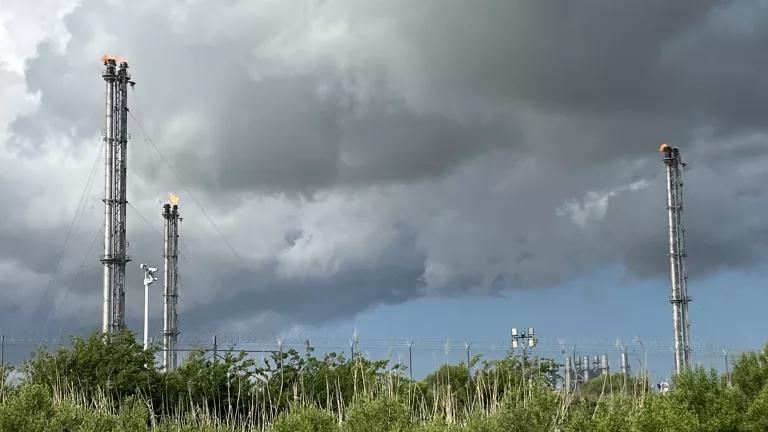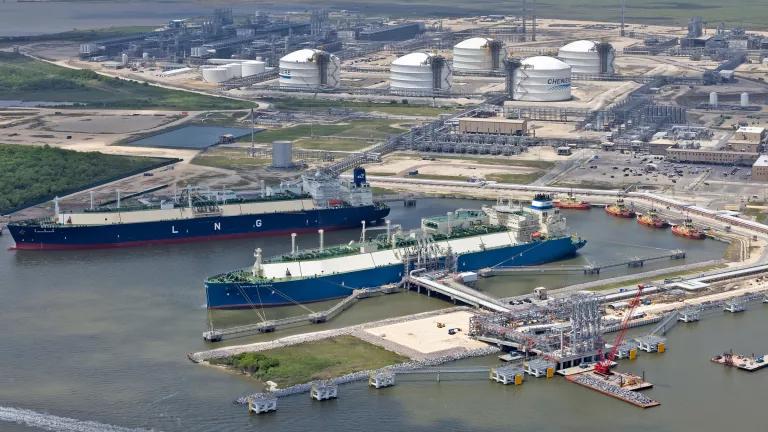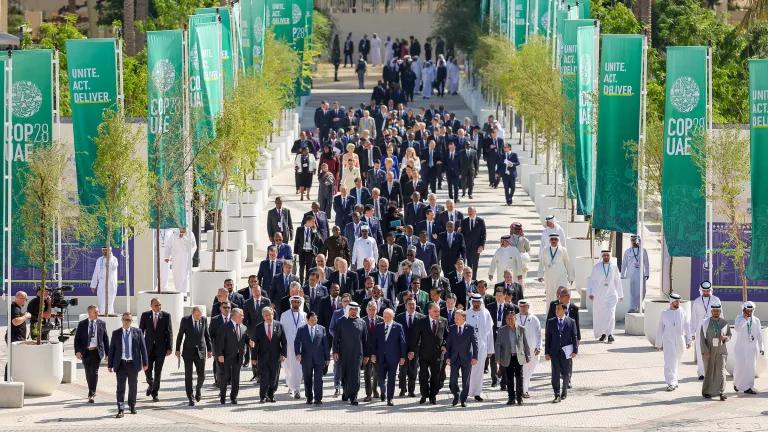Japan PM’s Visit to DC: A Defining Moment to Transition Away from LNG
PM Kishida’s visit marks a critical inflection point for the US and Japan to accelerate the transition away from LNG and embrace the renewable energy revolution

President Joe Biden with Japanese Prime Minister Fumio Kishida | The White House, Public domain, via Wikimedia Commons
Japanese Prime Minister Fumio Kishida will meet with U.S. President Joe Biden in Washington and address Congress on Wednesday and Thursday this week. Kishida’s visit, following the Biden administration’s update on new U.S. LNG export authorizations, marks a critical inflection point for the U.S. and Japan to accelerate the transition away from liquefied natural gas (LNG) and embrace the renewable energy revolution. Both countries play a critical role – in Asia and around the world – in increasing the scale and pace of renewable energy investment for energy and economic security needs.
Japan: A Persistent Driver of Global LNG Expansion
Prime Minister Kishida and the Japanese government are bankrolling the expansion of fossil gas globally. Japan stands out as one of the world’s top providers of public finance for gas, and the world’s largest provider of international public finance for LNG export capacity, providing $39.7 billion for projects built from 2012 onwards. Just in the two weeks ahead of Kishida’s meeting with Biden, Japan approved over $2.7 billion in financing for new gas projects, such as the controversial gas field in Australia, Block B gas project in Vietnam, the San Luis Potosi and Salamanca gas plants in Mexico, and financing to import LNG.
Given the imperative to accelerate global transition away from fossil fuels, President Biden should continue pushing Prime Minister Kishida to fully align with the international community in prioritizing support for renewable energy systems globally. Japan is yet to join the 41 development banks and governments, including the United States, who have signed onto the Glasgow Statement to end international public finance for fossil fuels by the end of 2022. This is despite Japan having joined a similar commitment in the G7 Leaders’ Communiqué in 2022. Japan’s continued financial support for LNG and gas projects stands in stark contradiction to the agreement among all 195 countries at COP28 in Dubai to transition away from fossil fuels by accelerating action in this decade in line with the science.
Japan’s Dangerous Links to U.S. and Global LNG
Japan is a leading financier of U.S. LNG export infrastructure and a top destination for U.S. LNG exports. Japanese banks are the top three private financiers of U.S. LNG export infrastructure. Japan’s export credit agencies, the Japan Bank for International Cooperation (JBIC) and Nippon Export and Investment Insurance, have poured over $8 billion into the Freeport and Cameron LNG export terminals along the Gulf Coast.
Despite Japan’s concerted financial support for expanding fossil gas usage globally, Japan’s domestic gas demand is on the decline. Even sources optimistic about the prospects of global gas expansion concede that Japanese gas demand likely peaked in the 2010’s and is no longer growing. As a result of this shrinking domestic consumption, many of Japan’s established LNG buyers are facing a position of persistent LNG oversupply through 2030. Japanese companies holding these excess volumes will likely look to resell their contracted gas overseas as an avenue to recoup their procurement costs.
Commercial interest in recouping costs on surplus gas as well as Japanese industrial ties to gas adjacent infrastructure (e.g. Mitsubishi Power and Mistubishi Heavy’s established gas turbine businesses) is likely a driving factor influencing Japanese investment in LNG expansion, especially overseas in South and Southeast Asia. Japanese energy security is not a primary driver of Japan’s posture on LNG; vested commercial interests trying to prolong the fossil fuel era seem to be driving the Kishida government’s decisions.

Stop LNG Protesters during Japan PM visit to White House
Charles Belt for Oil Change International
A Global Groundswell Against LNG Expansion
Frontline communities around the world strongly oppose Japan’s continued financial and political backing for LNG expansion. Regional movements like Fossil Free Japan and Don’t Gas Asia are united with U.S. groups in standing against LNG infrastructure expansion in their neighborhoods. In a recent press briefing, experts and civil society leaders from the Asia-Pacific and U.S. Gulf Coast emphasized:
- Travis Dardar, Louisiana Shrimper and Founder, Fishermen Interested in Saving Our Heritage (FISH), United States: “There are more families waking up next to this thing [LNG] gasping for air. I don’t know what the cleanest solution is, but I know that this isn't it. To continue down this path is very destructive, but they're willing to sacrifice Louisiana for profit.”
- Gerry Arances, Executive Director, Center for Energy, Ecology and Development, Philippines: “It's astonishing that countries that have been historically responsible for the climate crisis we now suffer are still putting more fossil fuels up, burning more, and financing massive expansion in the U.S., Southeast Asia, and the rest of the world. Japanese banks, including government owned JBIC, are at the forefront of this - to the detriment of people, biodiversity, and the energy transition of our countries.”
- Susanne Wong, Asia Program Manager, Oil Change International, United States: “To increase energy and economic security, Japan must end all international public finance for fossil fuels without exception, stop promoting fossil-based technologies and shift support to renewables. This includes investing in technologies such as offshore wind which can play a critical role in decarbonizing Japan’s energy system and those of partners globally.”
Bolstering renewable energy deployment and supply chains are key issues on the agenda for Biden and Kishida, including in their trilateral meeting with Philippines President Marcos. All three leaders must listen to the groundswell of opposition to LNG expansion from communities around the world and chart a truer course toward a 1.5-degree Celsius consistent future. The surest path to ensuring energy and economic security is boosting renewable energy and transitioning away from fossil fuels including fossil gas.
More resources on PM Kishida’s visit to the U.S. can be read in full below:
- Japanese PM Kishida must stop derailing the global energy transition
- Louisiana communities are suffering from Japan-funded LNG exports
- In a Warming World, the Philippines is Giving Far Too Warm a Welcome for Gas
- Expert Quotes on Japan’s Global Derailing of the Clean Energy Transition on Day of Japanese Prime Minister Kishida’s State Visit with U.S. President Biden
- Japan’s Fossil Finance Threatens to Derail the Energy Transition in Asia and Globally




